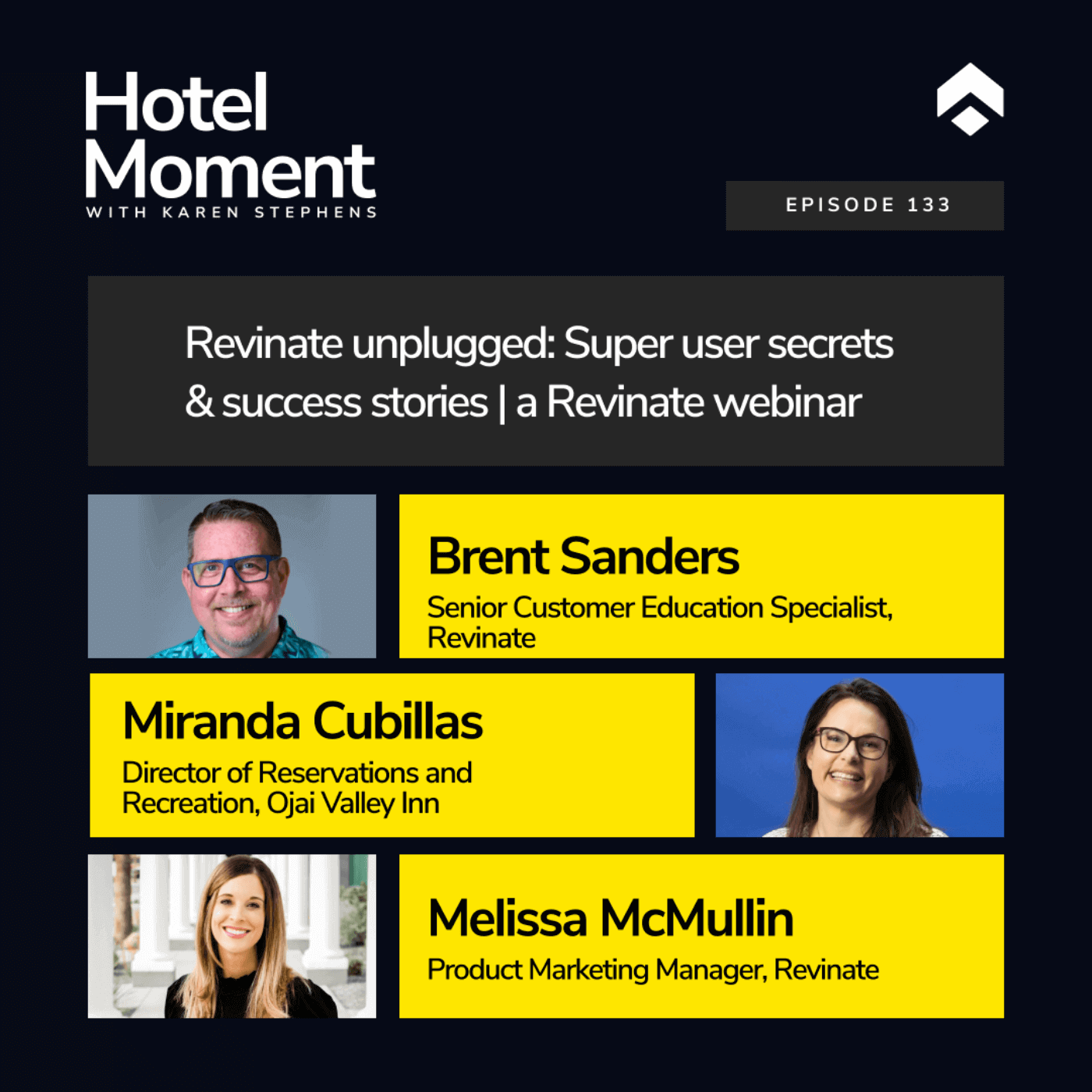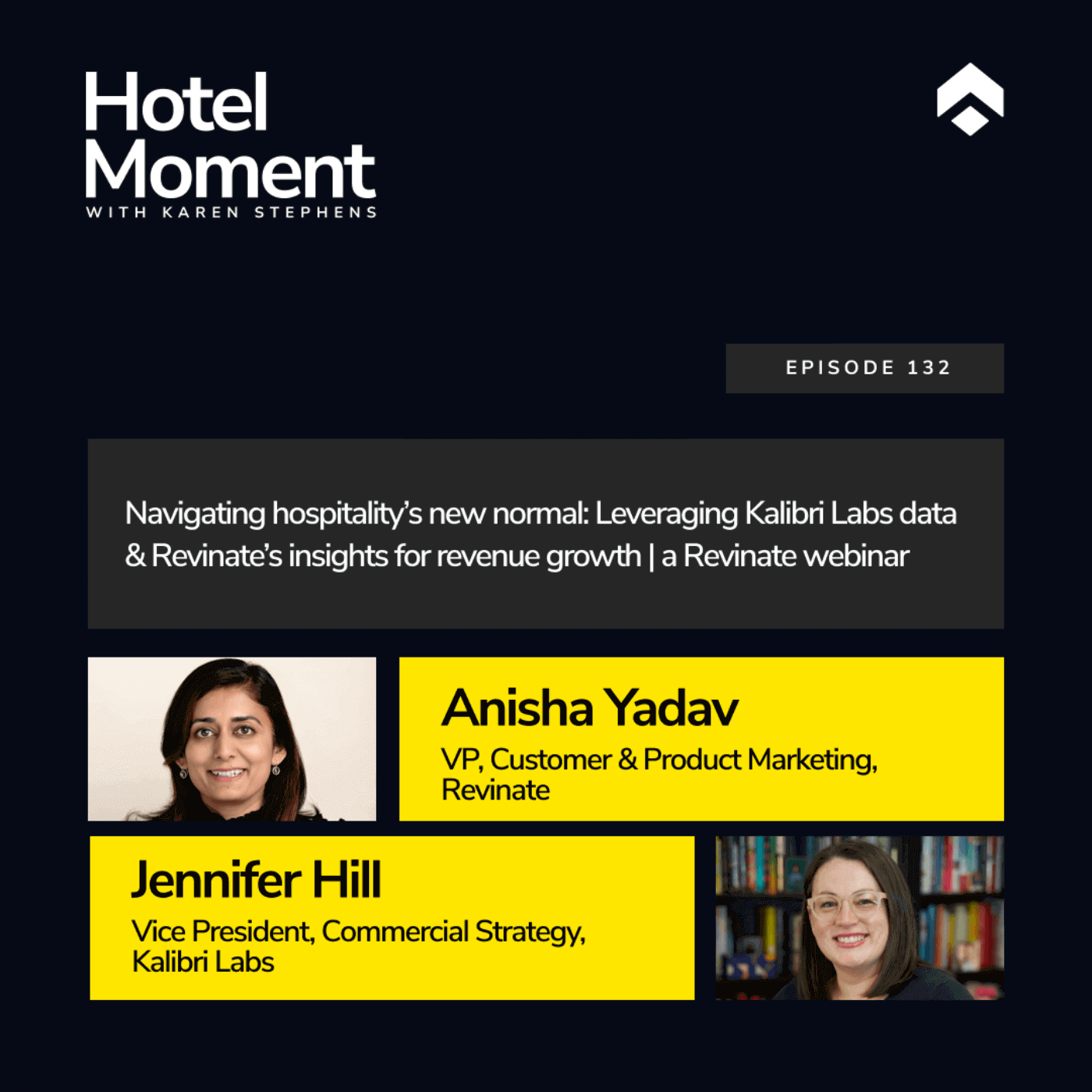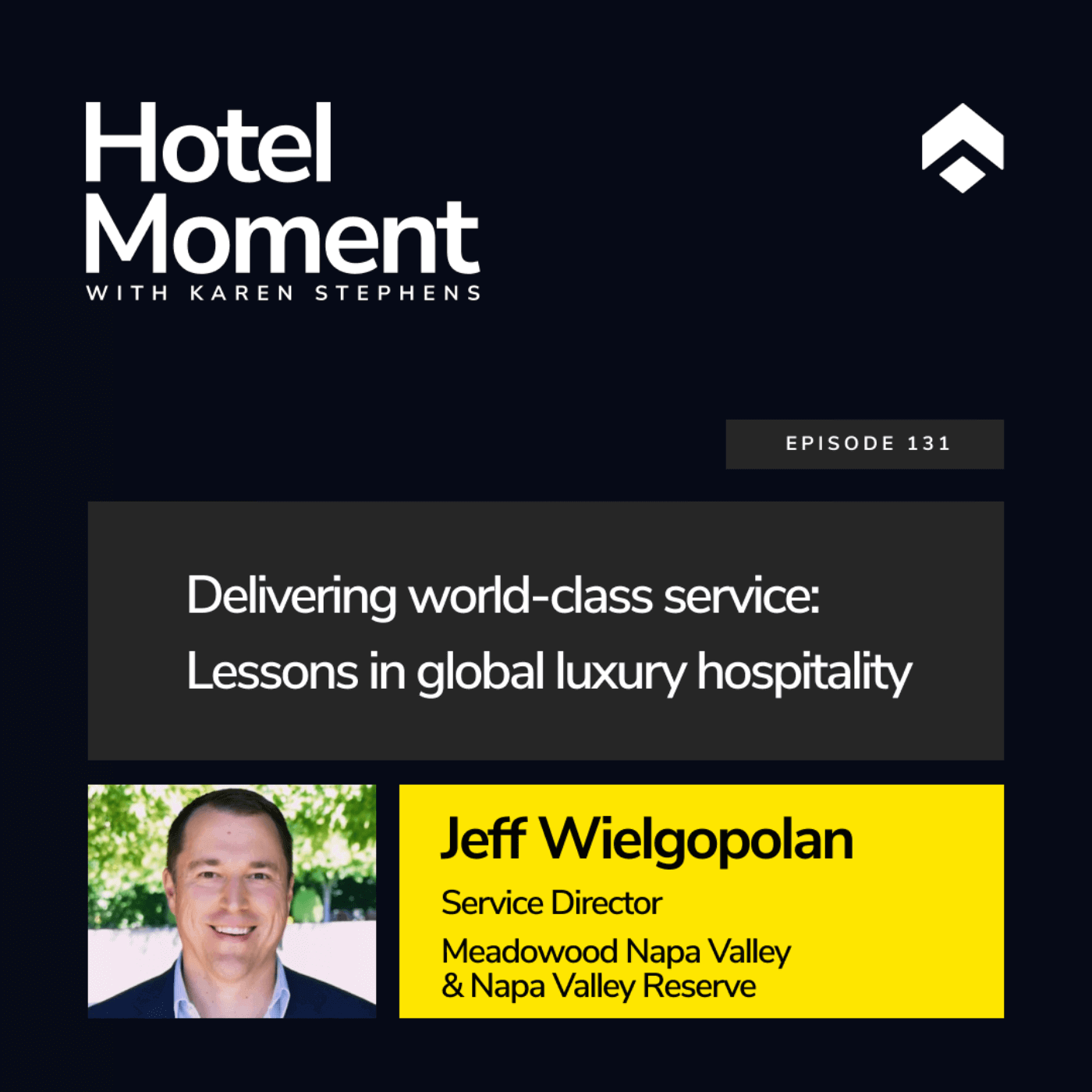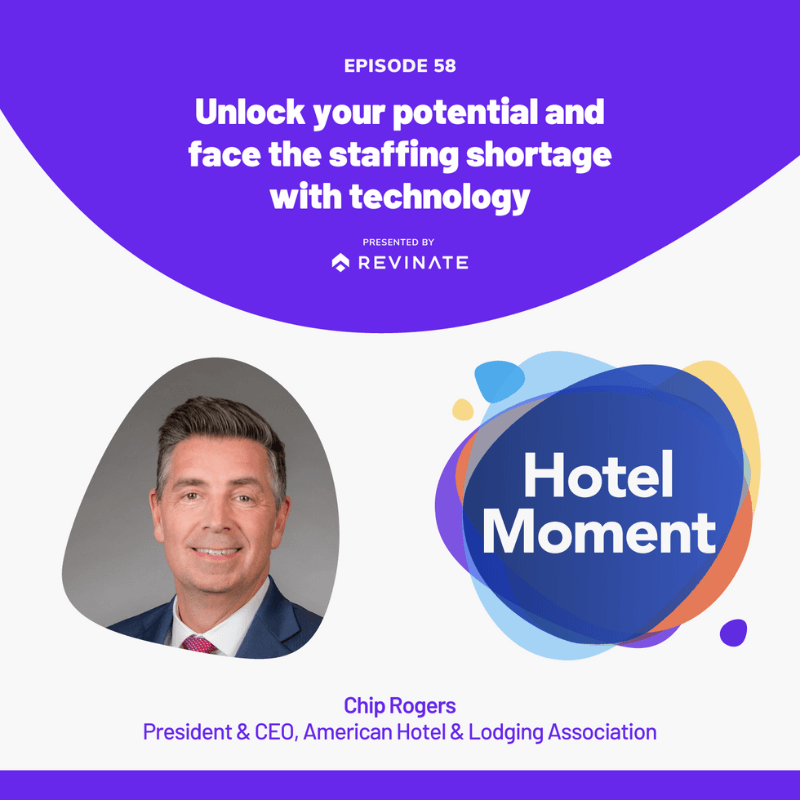

The Hotel Moment podcast — episode 58
Unlock your potential and face the staffing shortage with technology
In this week’s episode of the Hotel Moment podcast, Karen Stephens, Revinate’s CRO, and Chip Rogers, President and CEO of the American Hotel and Lodging Association (AHLA), discuss why the staffing shortage doesn’t have to be an obstacle to reach success. Rogers offers creative solutions hoteliers can use to expand their workforce, and explains how technology actually facilitates opportunities for staff to connect with guests.
Tune in and discover how you can attract talent while increasing operational efficiency to meet guest expectations.

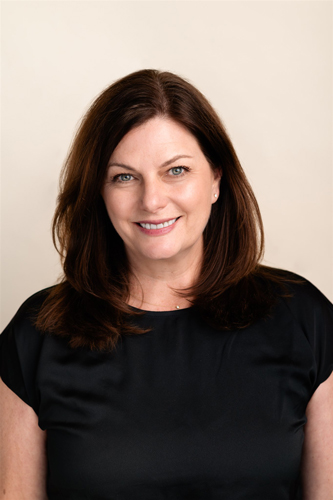
Meet your host
As Chief Marketing Officer at Revinate, Karen Stephens is focused on driving long-term growth by building Revinate’s brand equity, product marketing, and customer acquisition strategies. Her deep connections with hospitality industry leaders play a key role in crafting strategic partnerships.
Karen is also the host of The Hotel Moment Podcast, where she interviews top players in the hospitality industry. Karen has been with Revinate for over 11 years, leading Revinate’s global GTM teams. Her most recent transition was from Chief Revenue Officer, where she led the team in their highest booking quarter to date in Q4 2023.
Karen has more than 25 years of expertise in global hospitality technology and online distribution — including managing global accounts in travel and hospitality organizations such as Travelocity and lastminute.com
Now Playing
Media
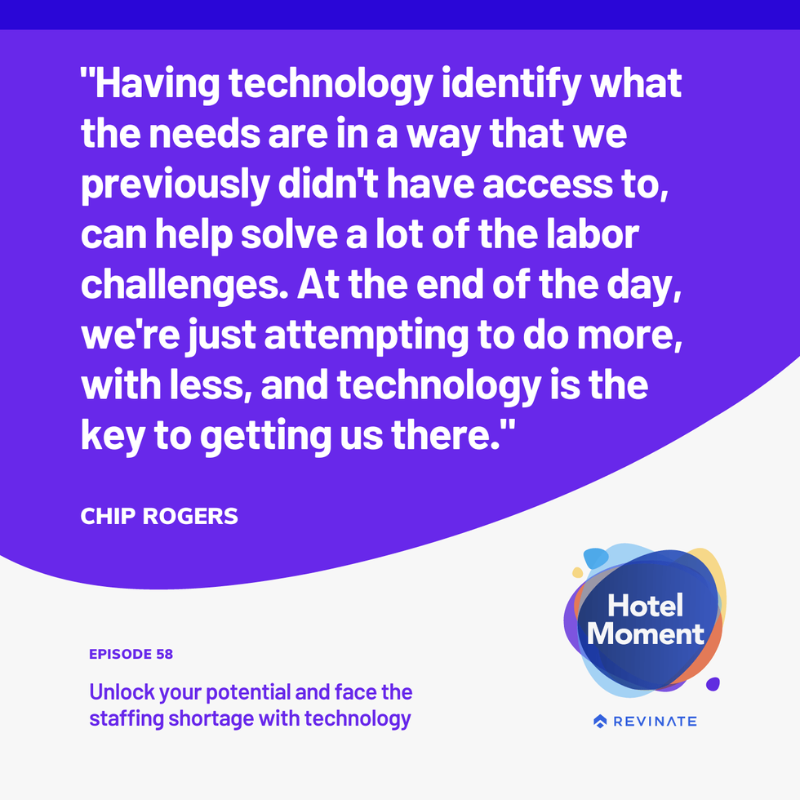
How technology creates more opportunties to focus on guest connections
Thinking creatively to attract staff
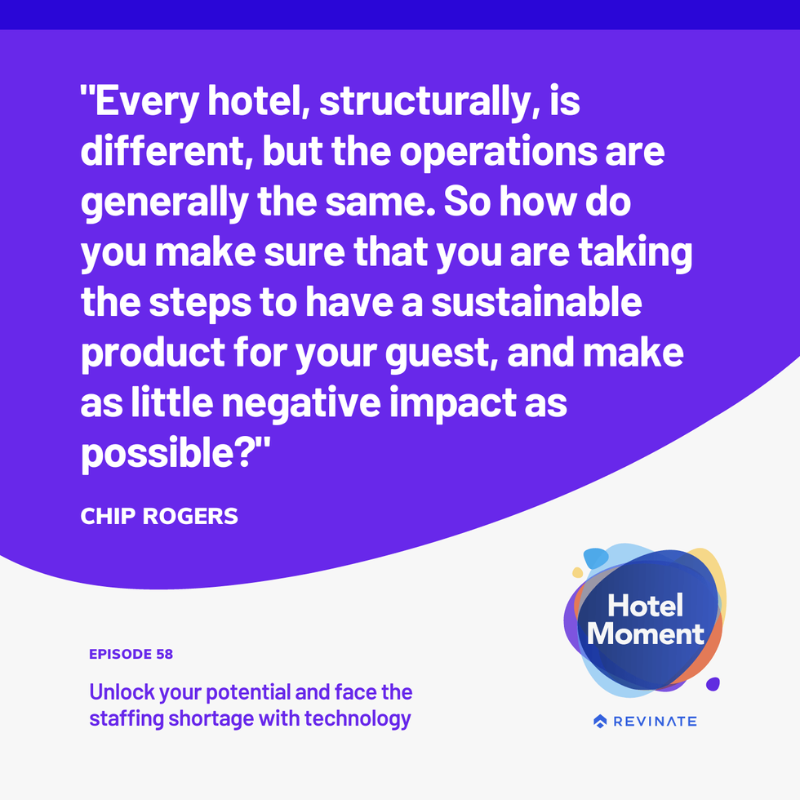
Taking sustainability initiatives seriously
Meeting the needs of your guests
Transcript
Karen Stephens: Hello and welcome everyone to the Hotel Moment podcast. I am your host, Karen Stephens, the Chief Revenue Officer of Revinate, and today I am delighted to be joined by Chip Rogers, who is the CEO of the AHLA, which stands for the American Hotel and Lodging Association. Welcome, Chip.
Chip Rogers: Karen, it is so good to be with you.
Thanks for having me.
Karen Stephens: Well, I’m delighted to have you with me, Chip, because I know in your role you are a man on the road, so it seems like every time we connect we are in a different city. So where are you calling in today from Chip?
Chip Rogers: I am in the great city of Chicago, Illinois
Karen Stephens: Chicago, Illinois.
Fantastic. But you are based in Washington, DC is that right?
Chip Rogers: That is correct. But as you noted earlier, my job requires extensive travel, and so most weeks I’m someplace other than Washington, DC for at least part of the week.
Karen Stephens: Okay, fantastic. Well, I can imagine in your role as CEO of the AHLA, it’s a lot of time in different cities, in different markets, making sure that the policies that are there, and the hotels you work with are making the most out of all of the markets that we operate in. So, on behalf of all of us, thank you for doing all of that travel.
Chip Rogers: Well, thanks. You can get tiring at times, but for the most part, it’s enjoyable.
I mean, you know, getting to work in this industry is, is really unlike any other. And so, I have just found that, and I know everybody always says this, but the people in this industry are truly the best, because to be in hospitality, I do think it takes somewhat of a special outlook on life.
And so even under the toughest of circumstances, especially the things we went through during the pandemic, just being around hotel people, it’s a lot of fun, and I enjoy it.
Karen Stephens: Yes, that’s right. Well, I echo those sentiments exactly. Great. Well, I have a lot of questions. I’d love to dive in with here, but I wanna start with a few personal questions, if that’s all right, to get us warmed up.
Chip Rogers: Sure.
Karen Stephens: Okay. So the first question is, when did you start working in the hospitality industry and do you remember your first day on the job?
Chip Rogers: Well, that’s kind of interesting because, officially my first step into working in the hotel industry, I was consultant, and I was consulting on advocacy-related issues.
And so, I can’t really tell you my first day on the job cause I don’t remember exactly when or how that happened. But I was consulting on, again, advocacy issues, trying to help the Hotel Owners Association with some of the challenges that they were facing in cities, and states, and even Washington DC. And so, that’s what kind of got me into it.
But I just don’t remember the exact person.
Karen Stephens: Right. Well, and I have to say, so a lot of times when we do these, these questions, I have guests who have been coming up through the hospitality ranks. I think it’s important for our listeners to understand that you actually came in from a political angle.
So, you served 6 terms as a state senator for Georgia.
Chip Rogers: Well actually served 5, I was elected 6 times. I have a unique, yeah, I have a unique political story. When I got into politics, I had made a personal pledge to myself and to no one else that the day that I no longer wanted to do it, or I just didn’t have the fire in the belly as they say, or the desire, that I’d willingly step aside.
And, and that’s actually what happened. I had won reelection easily, and was ready to start my 6ht term, and I just realized it wasn’t something that I wanted to do any longer. And you know, in those seats, it’s not your seat. You represent the people, and it’s the people’s seat, no matter what level of government you’re at.
And if you’re not able or willing to give 100 percent, you really need to step aside and let somebody else do it. And I followed through on that, and so I have a little bit of a different exit point on politics than most. Yeah, never lost an election, but just realized that mentally, I was kind of burned out. And so, somebody else ran and won and, and they don’t hand-hold that seat since that point.
Karen Stephens: Wow. That’s really cool. And I think that that’s something we can take into any, I mean, I always say that to people on my team as well, your heart isn’t in it anymore, do us all a favor, and go find something that your heart is really in.
And especially if you, as you said, you’re an elected official working for the people. That’s, that’s very critical, right?
Chip Rogers: It’s one thing if you’re only representing yourself, yes. But when you’re representing other people, they deserve 100 percent. And if you’re not able to give it, there are a long line of people who are.
Karen Stephens: Yeah okay, great. I love that. All right. Second question. What is the most uplifting moment so far in your career? And you’ve had a vast career, so let’s take it with the AHLA. What is your most uplifting moment so far in the current position you’re in?
Chip Rogers: Well, there have been so many. You know, during the pandemic, there was a time probably in April or May, you know, of 2020.
If you can go back to that point where the hotel industry had hit rock bottom. I mean, we had occupancy rates that were lower than at any time in the history of the industry, far lower than even the Great Depression. And there was not an end in sight, if you recall that time period, we kept thinking, is this gonna be over? Is this gonna be over? And we, we didn’t know there was. I mean, no one knew about vaccines moving forward or anything like that. Qnd it did look very bleak. The whole world had come to a stop, especially around travel. And we were able to work with our friends in Congress and get the PPP passed, the Pro-paycheck Protection Program.
And that was a lifeline to a lot of friends of mine, specifically, hotel owners who, I knew them, I knew their families. I knew how much they had over generations had put into their businesses, and I knew that without some financial assistance, they would go out of business. They would lose everything that their families had been working on, again, in some cases for generations.
So, being able to be a part of that, helping lead that effort, and make that happen, was great. But seeing what it did for those hotel owners, and how it helped many of them stay in business, and save their hotel business, that was the most uplifting part.
Karen Stephens: Wow. That is, that’s a great one. You know, Revinate serves exclusively the hospitality industry, so yeah, right.
Very familiar with those dark days when all of your customers are shut down, nobody is able to, you know, it was hard to get bills paid. It was. And you understand the circumstances, and I have to say, the PPP served our company as well, so it wasn’t just hospitality. So thank you for that. Yeah. I think a lot of businesses were able to hang on and keep their employees, which was a really big deal. A really big deal.
Chip Rogers: Well look, and you know, it’s sometimes important to remember, like I said, I’m sitting right here in Chicago and there’s a hotel here. And I’m familiar with a lot of the numbers that go on around these hotels, but one of the hotels here, they pay $38,000 a day just in property taxes. That doesn’t even begin to cover, you know, whatever debt they have, the employees, the power, any of that. And when you don’t have any customers, you have no revenue coming in, it’s hard to maintain paying those types of bills. And so there was a real threat that many of these hotels would go outta business.
Karen Stephens: Wow. That’s unimaginable. That’s hard to even wrap your brain around. So, wow. That’s a big one. Okay, so the third question for you, what is the most striking experience so far for you personally in terms of food, a stay, a holiday a personal vacation you’ve taken? And I know this is hard, you serve all of the US, so is there something that stands out maybe internationally?
Chip Rogers: So, you know, I’ve been blessed in my career both before getting into this, and of course during this, my time here, to get to travel to some of the world’s greatest destinations. Obviously, in my role at AHLA, 99% of that travel is domestic. So I have now visited 47 states, and every major city in the US multiple times.
But as I look back at just my life, even before getting into this role, I think the most memorable trip that I took was I had an eight-day trip to Israel. And it was sponsored by a well-known, I won’t get his name here, but well-known American businessman who had built a globally recognized brand.
And his goal was, at that time, was to increase, and to help facilitate relationships between the United States and Israel, so that we could learn from each other. And so the trip was set up in ways that we would learn all about the Israeli government, culture — everything, technology. And that was so amazing to me.
It’s a beautiful country, and I recommend anyone who ever has a chance to go there. You know, some say it’s the home to, you know, to 3 major religions and how that is woven into everyday society, and how in that part of the world, there are certain challenges that we don’t necessarily recognize here in the US and how you live through that on a day-to-day basis.
It’s really interesting. That was probably the most impactful trip that I personally have ever taken. And so I usually pointed that one as, as the one that kind of stands out amongst all the others.
Karen Stephens: Certainly. Well, you’re never gonna forget that one. I mean, it sounds really phenomenal.
That’s really cool. Really cool. Love it with the culture too. Okay, so how have you met any celebrities while you’ve been, you know, working in the trenches? Probably a ton, but does anyone come to mind?
Chip Rogers: Well I had the chance to meet most of the more recent presidents.
Karen Stephens: Oh my gosh.
Chip RogersL So, President Obama, well, I had met prior to getting into this role. George W. Bush, then President Obama. President Trump and President Biden. I’ve not actually met President Biden while he was president. I met him while he was Vice President and in the US Senate. But yeah, I mean, they’re all fairly well known. So, you know, you do get the chance to meet people, especially in my line of work, folks at the highest levels when it comes to government. But you also get to meet other famous people occasionally. But, you know, I’ll focus on those as being the most well-known, popular, I don’t know, popular or not.
Karen Stephens: Yeah. I asked this question to all of my guests, and I think you win. I think you win so far in terms of, and Obama’s always the top of my list, so.
Wow. That’s great. That’s great. Okay, and then the last question for you, who are the women at work you have been most inspired by?
Chip Rogers: Oh, wow. It’s interesting because I kind of look at — and I’ve had the just incredible opportunity in life to hire lots of people, and I get questions a lot about, you know, diversity, equity, and inclusion.
We at AHLA have a ton of resources going into that. But then I look back at my own life, and it’s like, well, what have I done? Like, “Wow, how, what have been my hiring practices?” And particularly around women I, have found, not because I made a concerted effort to do so, just because I always try to hire the best person.
I’ve actually hired far more women than I have men, and I don’t, that’s just a function of the candidates that came forth for these jobs. And so as I look around and look back, like, “Who are the people that you know, that I’ve hired and, and worked with I think would be even better that have made such positive impact?”
And there’s a, there’s a ton of them. 2 people come to mind. One is a lady I worked with for many years by the name of Rachel Humphrey. Probably one of the hardest, no problem, the hardest-working person I ever worked with. One of the smartest people I’ve ever worked with. Totally principled and just a joy to be around, and you know you are working with someone at that level that’s capable of so many amazing things.
And then right now, I actually have the honor and the joy of having our chairperson be Leslie Hale, who is the CEO of RLJ Lodging. And just an incredibly inspiring person handling her CEO role and a mother of 4, and doing work at a level and an intensity that is quite rare.
And it’s inspiring to be around people like that cuz they help raise you to a new level. Right?
Karen Stephens: Absolutely. Well, and you know, I love what you said at the top there because I, you know, again, the question I asked to everybody and it’s so wonderful to think that we’re at a place now, I think for a lot of companies where it is about the person, the candidate that you’re looking at, and regardless of gender, where they come from, background, it’s about the person themselves, their merits, and what they bring to the table.
So that’s great.
Chip Rogers: Well, look, I’ve been blessed with 4 children, 2 boys, 2 girls. And I look at the 4, and I say, “I don’t want them to ever get a job that they don’t deserve, but I don’t want them to ever be precluded from getting a job that they could deserve.” Right? And that’s just the way I look at life.
It’s like, like, “Are you the best candidate? Are you gonna help us? Are you gonna make a difference? Are you going to help advance whatever it is we’re trying to work on?” And you know, if you can come on board, if you can’t, you know, you’ll be a better fit somewhere else.
Karen Stephens: Exactly. Great. Okay, great.
Well, thank you for that. So let’s dive in here before we get right into the topics. I did wanna start with your role at with AHLA. Could you gimme a little bit more information about what your experience has been like as a CEO? You mentioned a lot of travel, but what does your day-to-day look like when you’re doing all of the work across the 47 states and all, the major capitals?
Chip Rogers: So, no day ever comes close to looking the same. You know, we represent the entire industry. So that’s from hotel owners, hotel brands to management companies. And to all the companies, even educational like, Cornell Hotel School, the dean of the schools on my board. So we represent the educational interest of the industry as well.
And then all of the vendors who sell goods and services. So there’s a lot of people that are impacted by what happens in the hotel industry every day. Our main role at AHLA is to simply be the voice of the industry to help protect it and help promote it. We do that in 2 ways through AHLA, which is mainly focused on advocacy at the city level, at the state level, and the federal level.
And then through our AHLA foundation, which is mainly focused on those who work in our industry and providing all the way, starting with educational scholarships to people who are in hospitality schools, to get them to come into our industry, to job training, to an apprenticeship program, to certification.
Working on all these things to help support those who make our industry very special. And so we kinda look at it from, from 2 different angles. And so, you know, my day-to-day is somewhere on that spectrum, right? I could be talking to the mayor of a city one day and then working, you know, with a vendor who’s trying to get more involved in the hotel industry on the next day. And everything in between.
And so, like I said, there’s no day that ever looks the same And the breadth of what I work with every day, it’s pretty broad. So it’s definitely not a narrow set of interests.
Karen Stephens: Wow. That is, yes. Yeah, that is a lot when you think about the full scope.
And you know, I think we’re early into 2023, but one trend I’ve been noticing a lot, I don’t know if you call it a trend, I think it’s a different way that we’re approaching hospitality is a real focus on sustainability. So could you talk a little bit about it? I know you have a Responsible Stay program that you’re sponsoring from the AHLA.
What is that and how does it impact hoteliers, and how should we think about sustainability in 2023?
Chip Rogers: You know, I think about it really from a couple of different lenses. And first is what should we be doing as a member, you know, in the hotel industry as a member of general society, I mean, how are we making a positive difference? And I think when you look through that lens, there are things that we can do better. Though, I will say the industry has done a lot of really good things. The second thing is, and this is, you know, at the core of running any business, “What do your customers want?”
What do the consumers want? And increasingly, and we actually track this, increasingly, consumers that stay in hotels say, we want to know that the operations of the hotel are being done in a sustainable way. And so our role at AHLA is to say, “How can we set industry-wide standards that everyone can achieve, and almost set a baseline that others can go above and beyond that?” But we want to create a unified, clearly understood baseline so that consumers know, “No matter what hotel I go to, they’re following at least these practices.” And many hotel brands will go above and beyond that. And so that’s what we’re doing with Responsible Stay is, is really uniting the industry around a set of standards.
We’re early on in the process. It will take a while, but every hotel structurally is different. Like the hotel I’m sitting in right now is different than the hotel— I can see about 5 of them outside my window here, but it’s different from the other ones down the street. But the operations are generally the same.
And so how do you make sure that you are operationally doing the things and taking the steps to have a sustainable product for your guest and make as little negative impact as possible. Right?
Karen Stephens: Okay. Right. Okay. So another big topic. I know that, you know, we mentioned the pandemic earlier and the impact that had on hospitality.
And I think kind of the hangover we still have from that is the labor shortage. Although, I think we’ve seen some improvements, but what are you seeing out there across the industry? And I know you also had some initiatives to help with that from a political standpoint. So can you talk a little bit about labor, and how you feel about that today?
What’s happening on the horizon that might be more positive? Anything that you can give us on that, on that front?
Chip Rogers: No question. The single biggest challenge the industry is facing and has faced for quite some time. It’s always important to remind people that, this is not a just a pandemic-generated challenge, though the pandemic made it much, much worse. Prior to the pandemic, at the end of 2019 ,industry-wide, and that includes direct hotel jobs and hotel related jobs, we’re about 900,000 people short in our industry. Then, along comes the pandemic, as we noted earlier — ccupancy drops off to, I think the low is around 14% at one point. And a vast majority of employees in the United States and our industry, direct hotel employees were either laid off or had their hours cut severely. And so that was kind of the backdrop for many people looking to leave the industry. Now we’ve built back up. Now the industry does look a little bit different cuz the consumer mix is is definitely weighted more towards leisure travel as opposed to to business travel.
But the jobs have come back, the opportunities are there, and again, it does look a little bit different, but the systemic problem of not having enough workers is still plaguing our industry and many other industries. And so we look at this in 2 different ways. One, how do we get a larger share of the pie? And the pie, being the number of available workers in the United States? How do, how do we encourage more of those people to come into our industry where, one wages are at the highest level they’ve ever been at historically in our industry? Highest wage level ever, and it’s much different. We sometimes get lumped into you know, with restaurants, particularly fast-service restaurants, and we love those folks. They’re great, they’re all part of a larger hospitality industry, but hotel wages are so much different than that. The average wage in the US now for hotel workers is over $23 an hour. Then you look at benefits, and flexibility, and the things that have changed during the pandemic are significant in and around benefits and flexibility, but the one thing I like to point out most often is about opportunity.
Because so many people left the industry, it means that a lot of those positions, even leadership positions, are still open and available. And so if you’re looking to build a career and move up the ladder really fast, right now is unquestionably the best time to do it in the hotel industry. And so that’s our effort on getting a larger share of the pie.
The second part of that is how do we make the pie larger? How do we have more available workers in the United States? Well, there’s only really one way to do that in the short term, unless people are gonna start having a lot more children, and that is having people who want to work in the US come to the US and work.
And that can be done in 2 ways. One through a guest worker program ,or 2, through having people immigrate here. And so we’re working in, in both ways to expand the guest worker program that is really, really limited right now. It probably only meets about 10% of the actual demand. And it’s important to remind people, guest workers, that’s not immigration, right?
People that come here and work for a brief period of time, maybe a season or so at a resort, and then go back home, those people are not immigrating to the US. They’re coming here to fill a need, and the need is dramatic. And I think we should do a lot more of that. And we work towards those ends.
Perfect example. Right now, there are people in the United States that are here seeking asylum, and whether you agree or disagree with our asylum law, that’s not really the issue. They’re legally here under US law, or at least under a court order, and they’re seeking asylum right now. There are a lot of those folks who want to work in hotels and maybe they’re actually staying or living in a hotel right now, but our law prevents them from doing so, which doesn’t really make any sense whatsoever. And so we’re working on some legislation with Senator Collins to say, “How can we shorten that time period right now?” They oftentimes have to wait up to 6 months before they can legally start working. “How can we get that down to 30 days so they can fill a need and do what they want to do?”
The second part of that is legal immigration. Is there a way to create a system, that we believe there is? That when there is a high demand for workers, like there is right now, and has been for quite some time, that more people can legally immigrate through the right process, and right pathways into the United States, and then when there’s less of a demand that you can restrict the number of people coming into the US because there’s just not the demand.
And so it’s not that tough. Like this system can be set up quite easily. The question is, is there the political will to do so? And we certainly support people on both sides of the aisle that see that a properly functioning immigration system that meets the economic demands of the United States is really important.
We polled Democrats and Republicans right after the last election, strangely enough, in a world where almost no issue Democrats and Republicans agree on, they, on a widespread basis, agree on this issue. And that is, a lack of workers is hurting the economy of the United States. I mean, at the end of the day, gross domestic product is real simple to calculate.
So the number of workers times their productivity. Well, in the US right now, productivity has dropped coming out of the pandemic. That’s unfortunate. We’ve gotta fix that. But the number of workers dropping is even worse, and that’s easily fixable. So we need more workers.
Karen Stephens: Right, and common sense legislation.
I mean, that’s what I hear you saying. You know, it’s like we have to quit being so polarized and, you know, on the far extremes and get to the middle, which for me is common sense, whether you’re a Republican or Democrat or wherever you, as you mentioned, wherever you stand on, on immigration.
But think about what really happens in the economy. And so yeah.
Chip Rogers: I can give you one perfect example cause I think this highlights exactly how absurd the last is. We haven’t had major reform since President Clinton, but right now there are 10s of 1000s of people in the United States from other countries that are being educated — in most cases, being educated at publicly supported, taxpayer-supported public schools under current law. For most of them, the day they graduate, they’re required or, soon thereafter, they’re required to return back to their home country. Even if they wanna stay here and work, and these are people in fields where we need help — engineers and scientists. Does it really make sense that the American taxpayer subsidizes their education and then we send them away so they can go work in another country to compete against us?
It honestly makes no sense at all.
Now, the problem is, politically is, if you put that legislation on the floor, it would pass. No question about it. But there are a lot of people in Congress that say, “Well, I don’t wanna do that unless I get the full comprehensive plan that fixes everything.”
We gotta stop looking at challenges that way. Let’s fix what we can fix today, and let’s work on what we can’t fix today, let’s work on that for tomorrow. But these simple things we need to fix right now.
Karen Stephens: Yeah, and so how, so Chip, how do people get involved? I mean, how do, how does the, you know, someone who’s listening to this podcast, what’s the best way to make sure that your voice is heard?
If you agree with this viewpoint, what do you suggest?
Chip Rogers: Well, for us, in our industry, we have a Program software called Hotels Act. If you just go to hotelsact.org, it’s free. It takes about 90 seconds to sign up. And what it does — it’s a really simple program, — every time there’s an issue that’s impacting the hotel industry, once you sign up for this, we know who your member of Congress is. We know who your member of your state legislature is, and if one of those issues arise, we’ll send you a message that says, “Hey. This is important.” We’ll pre-populate the message and you just have to click “yes”, and it goes to your member of Congress or to your member of the state legislature from you.
But it’s a message that we create for you. That’s a way that the industry can have a fully unified message on the things that matter. Going beyond just the industry, I always tell people that it’s actually a pretty simple thing. I call it, adopt a politician, but find somebody in your local community, whether it’s your member of Congress, your local mayor, member of the city council, somebody on the school board, just somebody in elected office, and build a relationship with them.
Go to them and say, “Hey, I work in this industry.” Hopefully, it’s the hotel industry, but even if it’s not, just saying, “I work in this industry. I know that what you do impacts my industry, and I know what my industry does probably impacts you. How can I become a resource for you to help you when there are questions that arise about my industry?”
You know, lawmakers are good at getting elected, and they come from some background at which I’m sure they’re good at as well, but they rarely know everything about every industry. In fact, I’ve never looked, or met a lawmaker that knows everything about every industry, and they need support. They need to know things about the industry that we work in that they would otherwise would never know.
And so we need to become a resource, not you know, they’re not looking for a best friend. They’re looking for someone they can rely on that will give them good information to help make better decisions. And that’s where we, just as American citizens, should step in and become resources
Karen Stephens: Absolutely. So the website again, is it one, one more time?
Chip Rogers: Hotelact.org.
Karen Stephens: Got it. Hotelsact.org. Hotels act.org. Okay, great. We’ll put it in the show notes for everybody listening to the podcast and yeah, get involved. Start local. Well start all the way up the chain, but figure out who your local people are and then—
Chip Rogers: It can be your, your politician, your doc. Yeah, there you go.
Karen Stephens: I love it. Okay. So just because this is a technology-based podcast, what are you seeing out there when you’re talking to different hoteliers about the adoption of AI? That seems to be the new thing out there. We’ve got a labor shortage. What are you seeing in the field to try and compensate for some of that? Not all of it, but some of it, with technology and AI in particular?
Chip Rogers: Yeah, we work with some companies that have done a lot of research on this, and I’ll just pinpoint one area, like, “What do guests most often need or ask for at a hotel?”
Like, they walk in, they’re in the room, and now they’re like, “Okay, I need to know this, or I need help with this.” What are those areas? And so, there’s some companies out there that have been able to identify those areas where, these are what guests are asking, and there’s really simple answers to that.
And AI can handle that so that a real human doesn’t have to constantly be on the phone answering these simple questions so that those humans especially in an environment where they have limited access to labor, they can be working on things that are much more important, and much more specific to the guests to create hospitality.
And that’s the beauty of our industry. It really is about the person, the human-to-human touch of hospitality. And so how can AI specifically answer the common questions to allow the real humans to answer the unique questions? And I think that is right out of the gate where AI can be very helpful, and is being very helpful.
The second part, and this has changed a lot during the pandemic, if you went back to pre-pandemic, housekeeping was basically 7:00 to 3:00 every day. Someone left a room and the housekeeper would clean that room, right? You really only need a room cleaned, not when the guest leaves, but before the next guest arrives. That’s the key, right? And so does it have to be done during those strict time periods? And now with technology, and a better understanding of when guests are arriving, when guests are leaving, you are able to schedule your workforce in a way that is much, much, much more efficient. Gone, in addition to that, is the typical 7:00 to 3:00 housekeeping schedule because you now have to work, reach out to people, and say, come to our industry, and you tell me what hours you wanna work.
If you wanna only work Tuesdays and Thursdays from 4:00 PM to 7:00 PM because you’ve got children, or you’re going to school or whatever, we’ll make that work. And having technology be able to identify what the needs are in a way that we previously didn’t have access to, or didn’t really put a lot of effort into.
That can help solve a lot of the labor challenges. I mean, at the end of the day, we’re just attempting to do more, with less, and technology is the key to getting us there.
Karen Stephens: Yeah, and I think those are really good points. One thing that we see, so we do have one of those apps we have a messaging app called Ivy, but 60% of it’s AI.
So you’re taking away from the hotel staff having an answer. “What’s the WiFi? Can I have more towels? What’s the room service menu?” And giving them more engaging ways to work. And then I think you really hit on it, because hotels are 24 7. We do have flexibility. So if you work for a hotel, there’s needs at all times, and people who work for the hotel, if you know how to set it up right for those employees, you can make it more flexible.
So, absolutely that’s exciting.
Chip Rogers: And if you don’t, all you’re doing, if you think about it, remember I spoke earlier about how do we get a larger share of the pie when you’re not flexible? You’re reducing the access of to the pie, right? Because you’re only gonna be able to go after fewer, and fewer people because there are many people who can’t meet your rigid demands, but if you’re flexible, there will be more people that you can gain access to.
Karen Stephens: They really will. And going back to something you talked about before, just about even at different management levels of hospitality where there’s opportunities for careers.
As somebody who’s been working in technology for hospitality for over 20 years, I just wanna encourage anybody who’s out there, who’s not in the field, what a great industry to be in. And once you get in, you don’t get out because of kind of what you pointed to before. You might move different jobs, different hotel companies but the spirit of the industry itself, and the people that we work with are really just, there’s nothing else like it. So, I just wanted to go back to that comment cuz it was so cool.
Chip Rogers: I appreciate that, cause I think that one of the things that we’re trying to do in changing the narrative of what it means to work in the hospitality industry, I myself probably say that term more than anybody, hospitality industry.
But if you’re a young person, young or not, and you’re thinking about this, look at it from the perspective of, what do you want to do? Like, what type of job do you want to do? I can almost assure you that it fits somewhere within the hotel industry. So don’t look at it as I’m joining the hotel industry. Look at it as, okay, I wanna be an engineer. You know what? There’s tons of engineers that work in the hotel industry. I wanna work in marketing. There’s tons of marketing jobs in the industry. I wanna do accounting. Tons of accounting jobs in the industry. So think about what you want to do, and I can almost assure you it fits into the hotel industry in some capacity.
Karen Stephens: Yeah, that’s right. Okay, well, any last words for our listeners? 2023 is here. We’re coming into the spring season. Hopefully, we’re gonna see some recovery continue. So any last final thoughts, or advice for our listeners out there? Obviously go stay at a hotel.
Chip Rogers: Go stay. Yeah, look, I mean, we do need help spreading the word about the opportunity that’s in the industry. We don’t have millions and millions of dollars to buy television ads to tell you, “Hey, come work in hotels.” What we do have is an, as you’ve noted, an energetic industry that people love. You mentioned a moment ago, once you get in, you don’t get out.
How do we spread that word? How do we say, look, “Whatever you’re doing, apply those skills in this industry, and you’re probably gonna really enjoy your job. You’re gonna get access to some really great people to work with, opportunities to travel, unlike most other industries.” And so it’s really great to work in the hotel industry, but it’s incumbent on us to tell that story.
And so it’s not just about the wages, the wages are great but it’s more than that. And, we’ve got to be the best ambassadors for our own industry, and when we do that, we can ultimately change the thought of the average person who doesn’t know that much about the hotel industry to say, “You know what, I’m gonna give that a shot.” And when we have more people doing that, we’re gonna be better off.
Karen Stephens: We’re gonna be better off. Well, Chip, it has been a real pleasure talking to you. Thank you so much. If anybody wants more information on AHLA, where should they go?
Chip Rogers: Just AHLA.com. We got a great website and there’s tons of stuff on there
Karen Stephens: Awesome. Okay. You heard it here first. Thank you so much, Chip, really enjoyed it, and we will talk again soon.
Chip Rogers: Thank you.

